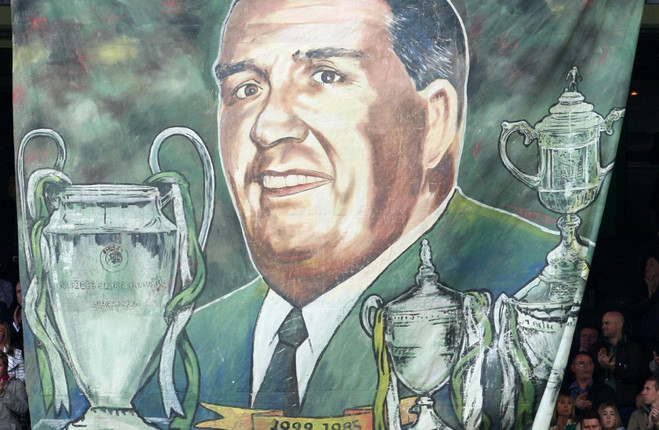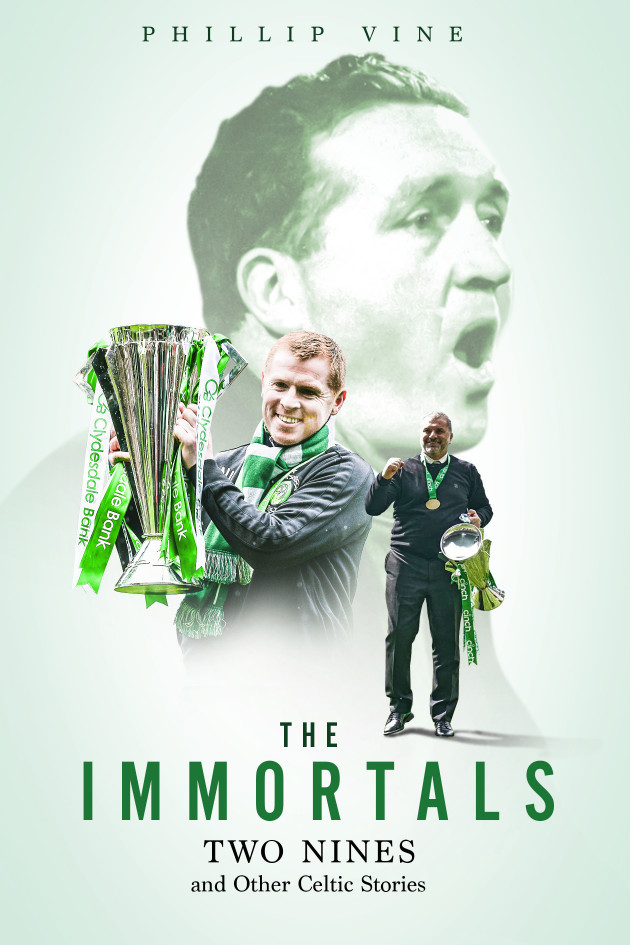THE FOLLOWING PASSAGE is an extract from The Immortals: Two Nines and Other Celtic Stories’ by Phillip Vine.
THE TACKLE
23 OCTOBER 1965
LEAGUE CUP FINAL, CELTIC V RANGERS
It was not something Sean Fallon would have done. Neither was it something Kelly would have countenanced had he known of Stein’s determination to target Rangers with a brand of physicality that trespassed on the bounds of assault.
Stein had achieved his initial target. In April 1965 he had reacquainted Celtic with the joy of victory, with the triumph of achievement, and he had done so by preaching the virtues of discipline and dedication.
Even in his own estimation, his imaginative training routines, his tactical intelligence, were lesser components of his masterplan than the inauguration of a thoroughgoing Protestant work ethic throughout the football club.
Celtic had won their first trophy since 1957 but had not yet defeated Rangers in a game that really mattered.
Inside the new manager’s psyche there already burned a fire whose flames had been fanned by his shunning by childhood friends in Burnbank, and by his own father’s refusal to concede defeat in his Protestant ambitions for his son.
It hurt Stein that George had never once wished him good luck either as a player or now as manager of Celtic. It was this wound, this pain, that gave Stein his cutting edge, his monstrous desire to overturn the natural order of matters football in the city of Glasgow.
Jim Craig, a Celt on amateur terms at the time of Stein’s arrival, said his manager ‘detested Rangers’. Craig suggested that Stein’s obsession with beating Rangers was because he had ‘crossed over’. There was nothing so republican, so Celtic, than a former loyalist, a former bluenose.
* * *
Celtic had given best to Rangers, and had surrendered even in the eyes of many supporters, since the heady days of the double of 1954.
Since then, the Ibrox club had won six league titles, four Scottish Cups and five League Cups. Celtic had won just three League Cups, a tournament considered by many Scots to be little more than a worthless bauble.
Celtic had won fewer than a quarter of the Old Firm derbies and, in the early years of the 1960s, the East End club were burdened by an inferiority complex to match their underachievement.
Sometimes, that sense of subordination was laughed off by players who had been permitted to indulge in dilettante behaviour both on and off the field of play.
As Stein said on his arrival from Hibernian, ‘I’m tired of hearing about Celtic’s potential, Celtic’s bad luck, Celtic’s missed chances.’
Stein revealed to Sean Fallon shortly afterwards, ‘It’s Rangers I’m after, and a league title after 12 lost years.’
The first opportunity to challenge Rangers’ pre-eminence, aside from an encouraging but unimportant win in the Glasgow Cup six days after the Scottish Cup triumph, was a league game at Ibrox in September 1965.
Stein was disappointed and apoplectic after a routine Rangers victory in which Celtic had attacked and the team in blue had defended as well as scored one more goal than their opponents. Nothing much, it seemed, had changed.
The next chance to overturn the old order would come in the League Cup Final in the following month.
The seeds of Celtic’s performance that autumn day at Hampden may have been sown in the away dressing room at East End Park on the Wednesday after the Scottish Cup win over Dunfermline.
As fate would have it, the fixture list provided the Pars with an early opportunity for revenge which they took to the tune of a 5-1 humiliation of the visitors.
The Celtic players trooped from the pitch, hangdog looks aplenty, but not one suspecting what awaited them. After all, they had won the cup only a few days previously, and that evening’s debacle was last-game-of-the-season unimportant.
Bobby Lennox reported that ‘the walls of the stadium must have been shaking’ as Stein let rip with foul-mouthed tirades and with individual eviscerations of each player’s lack of character, lack of backbone. ‘We were like jelly,’ Lennox added. From that moment, Stein ruled by fear.
Sean Fallon could pacify, and could talk tearful players round if he wished, but Stein would not countenance another performance without heart, without sinew, without mental steel.
The calm, urbane persona the manager had adopted before the Scottish Cup Final in April had disappeared.
In the week leading up to the League Cup Final in October, players had to deal with a tense and tetchy manager, one who prowled the corridors of Celtic Park by day and hotel corridors at Seamill by sleepless night after sleepless night.
His assistant, Fallon, said Stein knew Rangers’ players, their strengths, their weaknesses, better than they knew themselves. ‘He had eyes in the back of his head, he had spies, he had gossipers, he just drew on everybody.’
On the day of the final, Stein talked of the first 50-50 ball. ‘Win it,’ he growled. ‘Just fucking win it.’ He took Ian Young, the Celtic right-back, to one side. ‘Sort Johnston out first chance you get.’ Willie Johnston was Rangers’ left-winger and a key man in their attack.
* * *
The Tackle occurred in the very first minute of the game.
The ball found its way out to Rangers’ left touchline where Johnston anticipated control and swift movement towards the Celtic goal. He had not reckoned on his direct opponent’s fast and scything challenge that bypassed the football and almost cut the winger in half.
‘Your first tackle has to make a difference,’ Stein told Young as he left the dressing room. It did. Players paused while Johnston lay on the turf. It was as if Young had assassinated his rival in a play of brutal power politics. When Johnston rose to his feet, he was booked for his pains by referee Hugh Phillips, along with Young, but Johnston played no further significant part in the game.
At half-time, with Celtic two goals to the good thanks to a penalty double from John Hughes, Stein reprimanded Young for his reckless tackle:
‘You were lucky, son, you could have been sent off.’
Hypocrisy was not a characteristic notably associated with the Celtic manager but Stein had made it abundantly clear that any reduction of his team to 10 men had to be compensated by the wiping out of an important player from the opposition.
Young later said he regretted his assault on Johnston for the rest of his life. It is hard, though, to imagine Stein feeling any contrition. For him, winning was a matter of life and death, but winning against Rangers was even more important than that.
Neither would many Celtic fans have shared any remorse with their solid, if unspectacular, right-back who became a cult hero on the terraces from that moment onwards.
The tackle was a statement, loud and clear, that a new Celtic was emerging, one that would no longer be bullied by their great rivals, one that would never again give occasion for their supporters to turn their backs on their team as they had in the replayed cup final of 1963.
In spite of a Young own goal when a shot from Rangers captain John Greig was palmed away by Ronnie Simpson on to the defender’s face and into the net, Celtic held on to their victory with a calm and assured defensive display that frustrated and disconcerted their rivals in equal measure.
The headline writer in the Glasgow Herald, however, described the match as ‘An Orgy of Crudeness’. In his match report, Raymond Jacobs suggested, ‘When Celtic meet Rangers the meek do not inherit the earth; and war correspondents, rather than sports writers, should be despatched to these violent fronts.’
Stein did not care. Even Kelly, in spite of his protestations to the contrary, probably did not care. He could at last envision a future in which he was no longer subjected to abuse every time he made his way to his seat in the directors’ box.
* * *
It had, though, been a close-run thing.
History hangs in perpetual balance, depends on myriad moments of chance, when alternative universes are still open for business.
Perhaps, in some alternative, but equally real, time and place, Jim Forrest, the Rangers centre-forward, takes at least one of the two simple chances he creates for himself by bamboozling Billy McNeill with his pace and trickery. Both opportunities occurred before Celtic opened the scoring.
Maybe, in the 18th minute, Ronnie McKinnon, the Rangers defender, does not experience a moment of madness and raise his hand to push away a John Clark free kick. Maybe John Hughes misses the resultant penalty anyway. Ten minutes later, conceivably, the referee decides Davie Provan’s mistimed tackle on Jimmy Johnstone is unworthy of a second penalty. Maybe the Rangers goalkeeper, Billie Ritchie, makes stronger contact with the ball sent spinning into the corner of the net by Hughes. Maybe Ian Young is sent off because of The Tackle.
In the real world, however, Celtic were two goals in front and the League Cup was theirs to throw away, something which the team of McGrory and Kelly might well have done. As Stein said afterwards, ‘It would not have gone so well for Celtic had we not won today.’
* * *
When any era of dominance, whether of a sporting or of a political nature, begins to crumble, inevitably, some people are minded to violence.
With the Rangers players in their Hampden dressing room, and with Celtic parading their trophy around the perimeter of the pitch, some Ibrox fans climbed barriers and assaulted players and staff.
Young was struck and knocked to the ground as was the Celtic trainer and former player, Neilly Mochan. Fortunately, celebrating Celtic fans were models of restraint. The Scottish correspondent of The Times recalled an occasion in 1909 when both Celtic and Rangers fans rioted and burned goalposts and turnstiles at Hampden after the 36th Scottish Cup Final ended in a 2-2 draw.
Stein was relieved to see all his Celts return safely to the dressing room. He permitted himself a smile. Later, he would burst into song.
In his younger days, Stein had performed in the miners’ welfare social clubs. ‘Old Scots Mother of Mine’ was a favourite. Nowadays, Stein sang everywhere, and the song was often Sinatra’s 1964 hit, ‘The Best Is Yet to Come’.
The Immortals: Two Nines and Other Celtic Stories by Phillip Vine is published by Pitch Publishing. More info here.


